#GDPR: Personal data
Explore tagged Tumblr posts
Text

Tumblr’s Core Product Strategy
Here at Tumblr, we’ve been working hard on reorganizing how we work in a bid to gain more users. A larger user base means a more sustainable company, and means we get to stick around and do this thing with you all a bit longer. What follows is the strategy we're using to accomplish the goal of user growth. The @labs group has published a bit already, but this is bigger. We’re publishing it publicly for the first time, in an effort to work more transparently with all of you in the Tumblr community. This strategy provides guidance amid limited resources, allowing our teams to focus on specific key areas to ensure Tumblr’s future.
The Diagnosis
In order for Tumblr to grow, we need to fix the core experience that makes Tumblr a useful place for users. The underlying problem is that Tumblr is not easy to use. Historically, we have expected users to curate their feeds and lean into curating their experience. But this expectation introduces friction to the user experience and only serves a small portion of our audience.
Tumblr’s competitive advantage lies in its unique content and vibrant communities. As the forerunner of internet culture, Tumblr encompasses a wide range of interests, such as entertainment, art, gaming, fandom, fashion, and music. People come to Tumblr to immerse themselves in this culture, making it essential for us to ensure a seamless connection between people and content.
To guarantee Tumblr’s continued success, we’ve got to prioritize fostering that seamless connection between people and content. This involves attracting and retaining new users and creators, nurturing their growth, and encouraging frequent engagement with the platform.
Our Guiding Principles
To enhance Tumblr’s usability, we must address these core guiding principles.
Expand the ways new users can discover and sign up for Tumblr.
Provide high-quality content with every app launch.
Facilitate easier user participation in conversations.
Retain and grow our creator base.
Create patterns that encourage users to keep returning to Tumblr.
Improve the platform’s performance, stability, and quality.
Below is a deep dive into each of these principles.
Principle 1: Expand the ways new users can discover and sign up for Tumblr.
Tumblr has a “top of the funnel” issue in converting non-users into engaged logged-in users. We also have not invested in industry standard SEO practices to ensure a robust top of the funnel. The referral traffic that we do get from external sources is dispersed across different pages with inconsistent user experiences, which results in a missed opportunity to convert these users into regular Tumblr users. For example, users from search engines often land on pages within the blog network and blog view—where there isn’t much of a reason to sign up.
We need to experiment with logged-out tumblr.com to ensure we are capturing the highest potential conversion rate for visitors into sign-ups and log-ins. We might want to explore showing the potential future user the full breadth of content that Tumblr has to offer on our logged-out pages. We want people to be able to easily understand the potential behind Tumblr without having to navigate multiple tabs and pages to figure it out. Our current logged-out explore page does very little to help users understand “what is Tumblr.” which is a missed opportunity to get people excited about joining the site.
Actions & Next Steps
Improving Tumblr’s search engine optimization (SEO) practices to be in line with industry standards.
Experiment with logged out tumblr.com to achieve the highest conversion rate for sign-ups and log-ins, explore ways for visitors to “get” Tumblr and entice them to sign up.
Principle 2: Provide high-quality content with every app launch.
We need to ensure the highest quality user experience by presenting fresh and relevant content tailored to the user’s diverse interests during each session. If the user has a bad content experience, the fault lies with the product.
The default position should always be that the user does not know how to navigate the application. Additionally, we need to ensure that when people search for content related to their interests, it is easily accessible without any confusing limitations or unexpected roadblocks in their journey.
Being a 15-year-old brand is tough because the brand carries the baggage of a person’s preconceived impressions of Tumblr. On average, a user only sees 25 posts per session, so the first 25 posts have to convey the value of Tumblr: it is a vibrant community with lots of untapped potential. We never want to leave the user believing that Tumblr is a place that is stale and not relevant.
Actions & Next Steps
Deliver great content each time the app is opened.
Make it easier for users to understand where the vibrant communities on Tumblr are.
Improve our algorithmic ranking capabilities across all feeds.
Principle 3: Facilitate easier user participation in conversations.
Part of Tumblr’s charm lies in its capacity to showcase the evolution of conversations and the clever remarks found within reblog chains and replies. Engaging in these discussions should be enjoyable and effortless.
Unfortunately, the current way that conversations work on Tumblr across replies and reblogs is confusing for new users. The limitations around engaging with individual reblogs, replies only applying to the original post, and the inability to easily follow threaded conversations make it difficult for users to join the conversation.
Actions & Next Steps
Address the confusion within replies and reblogs.
Improve the conversational posting features around replies and reblogs.
Allow engagements on individual replies and reblogs.
Make it easier for users to follow the various conversation paths within a reblog thread.
Remove clutter in the conversation by collapsing reblog threads.
Explore the feasibility of removing duplicate reblogs within a user’s Following feed.
Principle 4: Retain and grow our creator base.
Creators are essential to the Tumblr community. However, we haven’t always had a consistent and coordinated effort around retaining, nurturing, and growing our creator base.
Being a new creator on Tumblr can be intimidating, with a high likelihood of leaving or disappointment upon sharing creations without receiving engagement or feedback. We need to ensure that we have the expected creator tools and foster the rewarding feedback loops that keep creators around and enable them to thrive.
The lack of feedback stems from the outdated decision to only show content from followed blogs on the main dashboard feed (“Following”), perpetuating a cycle where popular blogs continue to gain more visibility at the expense of helping new creators. To address this, we need to prioritize supporting and nurturing the growth of new creators on the platform.
It is also imperative that creators, like everyone on Tumblr, feel safe and in control of their experience. Whether it be an ask from the community or engagement on a post, being successful on Tumblr should never feel like a punishing experience.
Actions & Next Steps
Get creators’ new content in front of people who are interested in it.
Improve the feedback loop for creators, incentivizing them to continue posting.
Build mechanisms to protect creators from being spammed by notifications when they go viral.
Expand ways to co-create content, such as by adding the capability to embed Tumblr links in posts.
Principle 5: Create patterns that encourage users to keep returning to Tumblr.
Push notifications and emails are essential tools to increase user engagement, improve user retention, and facilitate content discovery. Our strategy of reaching out to you, the user, should be well-coordinated across product, commercial, and marketing teams.
Our messaging strategy needs to be personalized and adapt to a user’s shifting interests. Our messages should keep users in the know on the latest activity in their community, as well as keeping Tumblr top of mind as the place to go for witty takes and remixes of the latest shows and real-life events.
Most importantly, our messages should be thoughtful and should never come across as spammy.
Actions & Next Steps
Conduct an audit of our messaging strategy.
Address the issue of notifications getting too noisy; throttle, collapse or mute notifications where necessary.
Identify opportunities for personalization within our email messages.
Test what the right daily push notification limit is.
Send emails when a user has push notifications switched off.
Principle 6: Performance, stability and quality.
The stability and performance of our mobile apps have declined. There is a large backlog of production issues, with more bugs created than resolved over the last 300 days. If this continues, roughly one new unresolved production issue will be created every two days. Apps and backend systems that work well and don't crash are the foundation of a great Tumblr experience. Improving performance, stability, and quality will help us achieve sustainable operations for Tumblr.
Improve performance and stability: deliver crash-free, responsive, and fast-loading apps on Android, iOS, and web.
Improve quality: deliver the highest quality Tumblr experience to our users.
Move faster: provide APIs and services to unblock core product initiatives and launch new features coming out of Labs.
Conclusion
Our mission has always been to empower the world’s creators. We are wholly committed to ensuring Tumblr evolves in a way that supports our current users while improving areas that attract new creators, artists, and users. You deserve a digital home that works for you. You deserve the best tools and features to connect with your communities on a platform that prioritizes the easy discoverability of high-quality content. This is an invigorating time for Tumblr, and we couldn’t be more excited about our current strategy.
#HOE I DONT CARE#I AM NOT YOUR PRODUCT#I CAME HERE BECAUSE THE OTHER WENSITES TREAT ME LIKE A PRODUCT THE MOST#IDGAF ABOUT YOUR CRUSTY SHAREHOLDERS OR YOUR PROFITS#BUDDY THIS IS THE INTERNET#YOULL BE LINKROT SOMEDAY :)#also if you start to not comply with gdpr shit i'll just delete my account#which means you BETTER make your selling of my data an opt out still#and them that means i'd still delete your pp and set my vpn to sweden then#like i get my data is collected whatever i do but i am NOT A PRODUCT I AM A LIVING BREATHING PERSON
65K notes
·
View notes
Text
GDPR la extrem: Comisia Europeană, amendată pentru încălcarea propriilor reguli
Într-un exemplu care ilustrează rigurozitatea aplicării Regulamentului General European privind Protecția Datelor (GDPR), Curtea Europeană de Justiție a sancționat Comisia Europeană pentru nerespectarea normelor emise chiar de această instituție. Ancheta a dezvăluit că funcționarii Comisiei au transferat datele personale ale unui cetățean european în Statele Unite fără a respecta prevederile…
#amenda GDPR#bam#Comisia Europeană#Curtea Europeană de Justiție#data protection#diagnosis#diagnoza#EU legislation#EU sanctions#European Commission#European Court of Justice#gdpr#GDPR fine#GDPR regulation#GDPR violations#german#încălcări GDPR#legislație europeană#meta#neamt#personal data transfer#Protecția datelor#regulament GDPR#reguli stricte#roman#sancțiuni UE#strict rules#transfer date personale
0 notes
Text

I've seen a number of people worried and concerned about this language on Ao3s current "agree to these terms of service" page. The short version is:
Don't worry. This isn't anything bad. Checking that box just means you forgive them for being US American.
Long version: This text makes perfect sense if you're familiar with the issues around GDPR and in particular the uncertainty about Privacy Shield and SCCs after Schrems II. But I suspect most people aren't, so let's get into it, with the caveat that this is a Eurocentric (and in particular EU centric) view of this.
The basic outline is that Europeans in the EU have a right to privacy under the EU's General Data Protection Regulation (GDPR), an EU directive (let's simplify things and call it an EU law) that regulates how various entities, including companies and the government, may acquire, store and process data about you.
The list of what counts as data about you is enormous. It includes things like your name and birthday, but also your email address, your computers IP address, user names, whatever. If an advertiser could want it, it's on the list.
The general rule is that they can't, unless you give explicit permission, or it's for one of a number of enumerated reasons (not all of which are as clear as would be desirable, but that's another topic). You have a right to request a copy of the data, you have a right to force them to delete their data and so on. It's not quite on the level of constitutional rights, but it is a pretty big deal.
In contrast, the US, home of most of the world's internet companies, has no such right at a federal level. If someone has your data, it is fundamentally theirs. American police, FBI, CIA and so on also have far more rights to request your data than the ones in Europe.
So how can an American website provide services to persons in the EU? Well… Honestly, there's an argument to be made that they can't.
US websites can promise in their terms and conditions that they will keep your data as safe as a European site would. In fact, they have to, unless they start specifically excluding Europeans. The EU even provides Standard Contract Clauses (SCCs) that they can use for this.
However, e.g. Facebook's T&Cs can't bind the US government. Facebook can't promise that it'll keep your data as secure as it is in the EU even if they wanted to (which they absolutely don't), because the US government can get to it easily, and EU citizens can't even sue the US government over it.
Despite the importance that US companies have in Europe, this is not a theoretical concern at all. There have been two successive international agreements between the US and the EU about this, and both were struck down by the EU court as being in violation of EU law, in the Schrems I and Schrems II decisions (named after Max Schrems, an Austrian privacy activist who sued in both cases).
A third international agreement is currently being prepared, and in the meantime the previous agreement (known as "Privacy Shield") remains tentatively in place. The problem is that the US government does not want to offer EU citizens equivalent protection as they have under EU law; they don't even want to offer US citizens these protections. They just love spying on foreigners too much. The previous agreements tried to hide that under flowery language, but couldn't actually solve it. It's unclear and in my opinion unlikely that they'll manage to get a version that survives judicial review this time. Max Schrems is waiting.
So what is a site like Ao3 to do? They're arguably not part of the problem, Max Schrems keeps suing Meta, not the OTW, but they are subject to the rules because they process stuff like your email address.
Their solution is this checkbox. You agree that they can process your data even though they're in the US, and they can't guarantee you that the US government won't spy on you in ways that would be illegal for the government of e.g. Belgium. Is that legal under EU law? …probably as legal as fan fiction in general, I suppose, which is to say let's hope nobody sues to try and find out.
But what's important is that nothing changed, just the language. Ao3 has always stored your user name and email address on servers in the US, subject to whatever the FBI, CIA, NSA and FRA may want to do it. They're just making it more clear now.
9K notes
·
View notes
Text
How to Manage Your Digital Footprint
In today’s interconnected world, our online presence is more significant than ever. Every click, share, and post contributes to our digital footprint, shaping how we are perceived both personally and professionally. This comprehensive guide on how to manage your digital footprint aims to equip you with the knowledge and tools necessary to take control of your online identity, ensuring it reflects…
#audit#cybersecurity#data breaches#data management#data policies#data privacy#data protection#data sharing#digital audit#digital footprint#digital identity#digital rights#digital safety#Digital Security#Electronic Frontier Foundation#encryption#GDPR#Google Alerts#internet footprint#internet privacy#internet security#online identity#online interactions#online presence#online privacy#online reputation#online security#online tracking#personal data#personal information
1 note
·
View note
Text
Carrefour's AI Revolution: Enhancing Shopping Experience with OpenAI's GPT-4
Just had a conversation with my shopping cart. 🛒✨ It knew my budget, food preferences, & even suggested recipes! Thanks to #AI, #grocery shopping is no longer a chore, it's a chat. Are we in 2023 or 3023? 🚀 #Carrefour #OpenAI #FutureOfRetail
Carrefour, the French multinational retail corporation, has taken a significant step in advancing its digital strategy by deploying three novel tech solutions, all powered by OpenAI’s GPT-4 technology. These innovations include an advice-giving chatbot named ‘Hopla’, interactive product descriptions, and support for purchasing procedures. A Personal Shopping Assistant: Meet Hopla As of 8 June,…

View On WordPress
#AI in Retail#AI Technology#Carrefour#Chatbot#Customer Experience#Data Security#digital transformation#E-commerce#future of work#GDPR Compliance#GPT-4#OpenAI#Personalized Shopping
0 notes
Text
Well hot damn if it wasn't enough for this loser to throw a public tantrum now he's going out of his way to follow predestrogen on other platforms and start harassing her there!!! You can't hide these Matt I got the screenshots lol!!!!!!
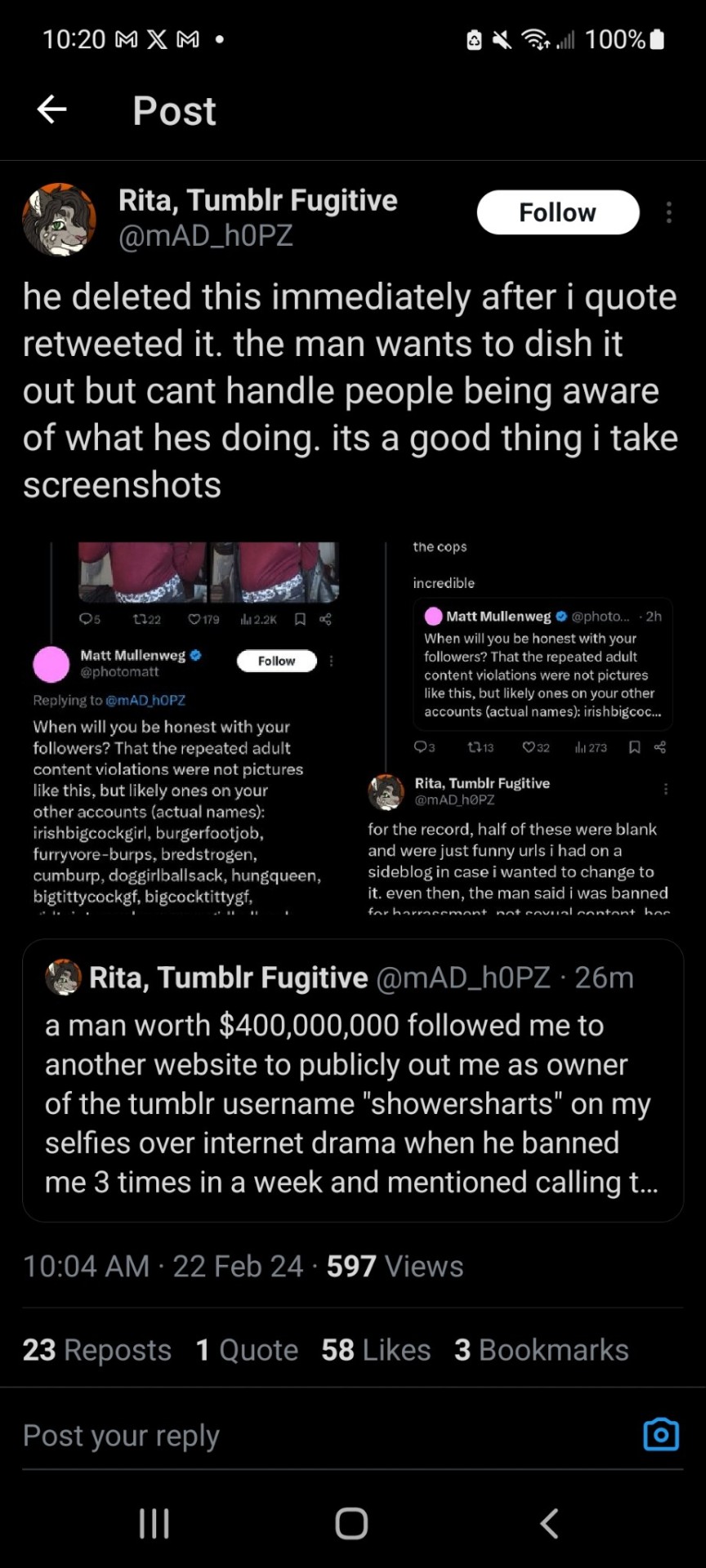

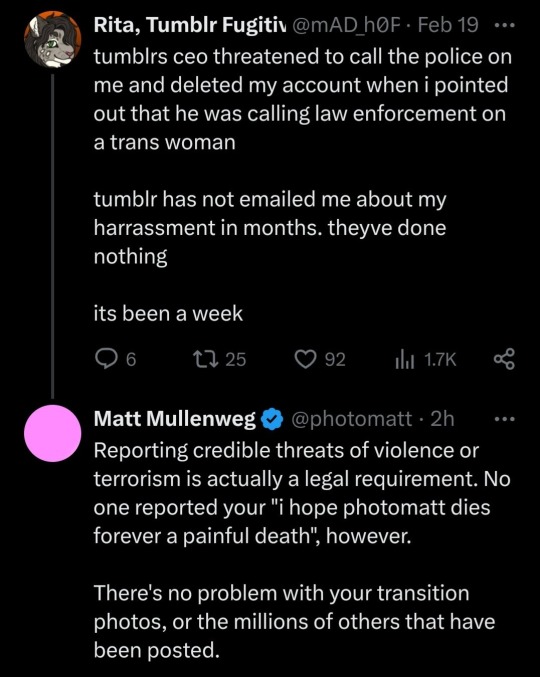
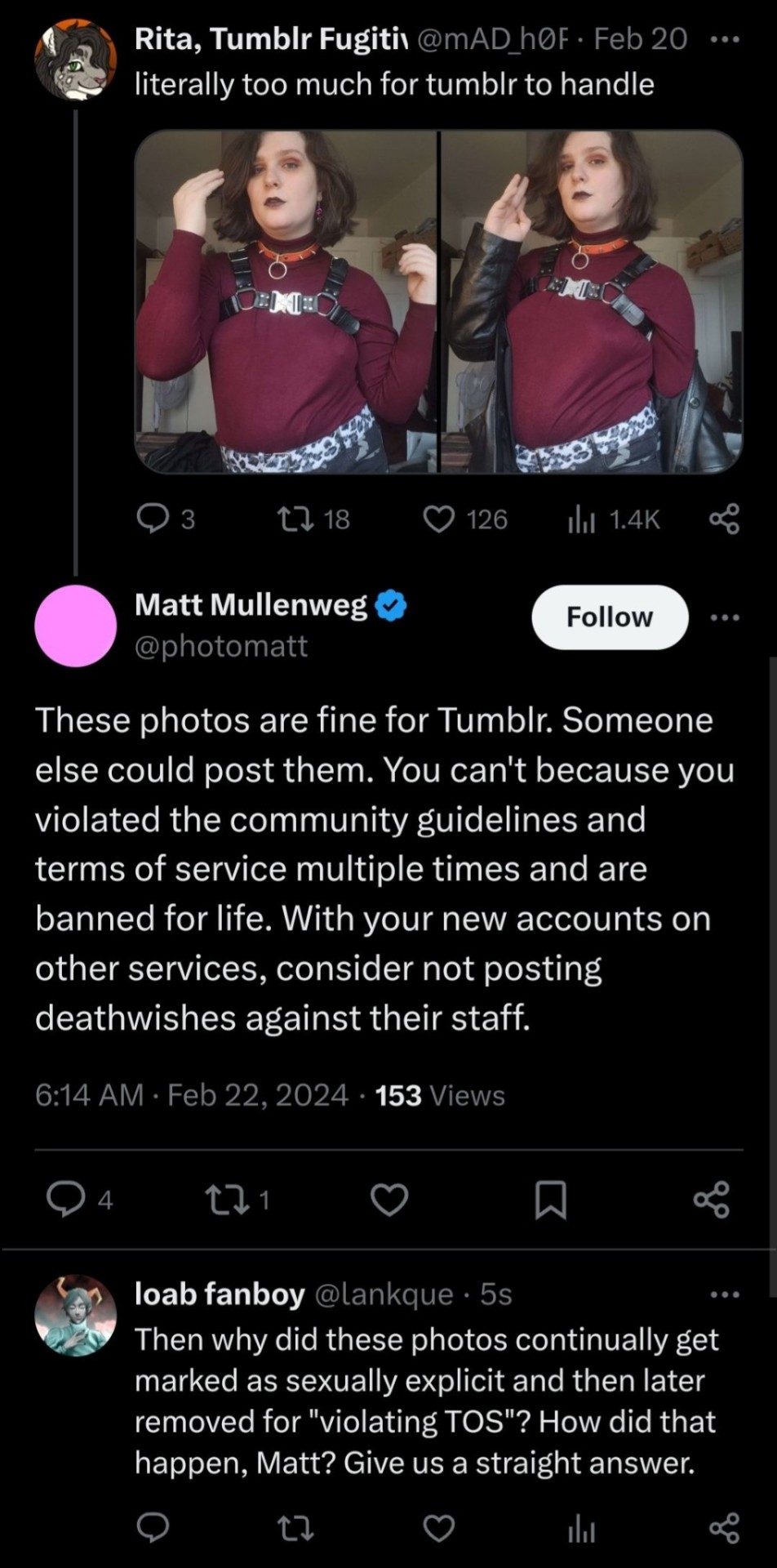

HE'S BLATANTLY LYING OUT OF HIS ASS!! SPREAD IT AROUND!! And also since she seems to be from Ireland even though I don't even know shit about eu laws from what little I do know this is a big violation of GDPR and should be reported as such!! https://commission.europa.eu/law/law-topic/data-protection/reform/rights-citizens/redress/what-should-i-do-if-i-think-my-personal-data-protection-rights-havent-been-respected_en
#fuck tumblr#fuck photomatt#carhammerexplosionmatt#predesterone#predestrogen#cyprederone#transgender#transmisogny#incoming lawsuit#photomatt#clown emoji
4K notes
·
View notes
Text
Recent Developments in Data Privacy and Their Implications for Business
Recent Developments in Data Privacy and Their Implications for Business
Data privacy is a hot topic in today’s digital world. Here are nine recent developments that changed the data privacy landscape and what they mean for businesses and consumers. 1. The EU General Data Protection Regulation (GDPR) came into force in May 2018, creating a unified data protection framework across the EU and giving individuals more control over their personal data. The EU General…

View On WordPress
#BCR#binding corporate rules#California Consumer Privacy Act#CCPA#CDPSA#China Information Protection Law#CJEU#Court of Justice of the European Union#data privacy#Digital Markets Act#DMA#DSA#EU Digital Services Act#EU General Data Protection Regulation#GDPR#Global Privacy Control#GPC#India Personal Data Protection Bill#PDPB#PIPL#Schrems II#Senator Kirsten Gillibrand#UK Data Protection Act#US Consumer Data Privacy and Security Act
0 notes
Text
Chat Control in a nutshell (please reblog this, US people)










Find out more about Chat Control here TAKE ACTION HERE ! OR HERE Calling is much more efficient ! The latter link will redirect you to the official websites of your respective reps. Under the "read more", you will find what you need to say/write when contacting your reps. You will also find an alternate format of this comic,and I give explicit permission for people to translate it and spread it anywhere for awareness. Credit really not needed, I don't care about that rn Even if this is a EU proposal, I am urging Americans to also share this, since it goes hand in hand with KOSA. DON'T FORGET TO JOIN OUR DISCORD SERVER AGAINST CHAT CONTROL ! https://discord.com/invite/e7FYdYnMkS

(Latest update on Chat Control was the 12 september 2024) This is a little long, so feel free to shorten it as you wish : Subject line: "2022/0155(COD) Dear Sir/Madam, I am writing to express my grave concerns regarding the proposed introduction of "Chat Control" This measure poses a serious threat to the privacy and fundamental rights of all EU citizens and stands in stark contradiction to the core principles that the European Union seeks to uphold. The proposed Chat Control contravenes Articles 7 and 8 of the Charter of Fundamental Rights of the European Union, which guarantee the right to respect for private and family life and the protection of personal data. The indiscriminate surveillance of private messages without specific suspicion or cause directly violates these fundamental rights. The General Data Protection Regulation (GDPR) sets out stringent rules for the processing of personal data. The proposed indiscriminate surveillance and scanning of private messages before end-to-end encryption is fundamentally incompatible with the principles of data minimization and purpose limitation enshrined in the GDPR. Specifically, Articles 5 and 6 of the GDPR, which govern the lawfulness and principles of data processing, would be violated by the introduction of such measures. The implementation of Client-Side Scanning (CSS) on devices means that all messages and files are scanned on the user's device before being encrypted and sent. This effectively nullifies the protection offered by end-to-end encryption and opens the door to misuse and additional security vulnerabilities. Moreover, the technical capability to scan such content could be exploited by malicious actors to circumvent or manipulate surveillance mechanisms. Such far-reaching surveillance measures not only endanger privacy but also freedom of expression. The knowledge that their private messages are being scanned and monitored could significantly restrict individuals' willingness to freely express themselves. Additionally, trust in digital communication platforms would be severely undermined. I urge you to take a strong stance against this disproportionate and unlawful measure. The privacy and digital rights of EU citizens must be safeguarded. It is imperative that we protect our fundamental rights and ensure transparency in the decision-making processes of our leaders. For more detailed information on the proposal and its implications, please refer to the following resource: Link to Netzpolitik article. https://www.patrick-breyer.de/rat-soll-chatkontrolle-durchwinken-werde-jetzt-aktiv/ Thank you for your attention to this critical matter. Sincerely, [Name] Art. 10 GG , Art. 8 & 11 EU Charta , Art. 8 EMRK (Alternate comic here V)
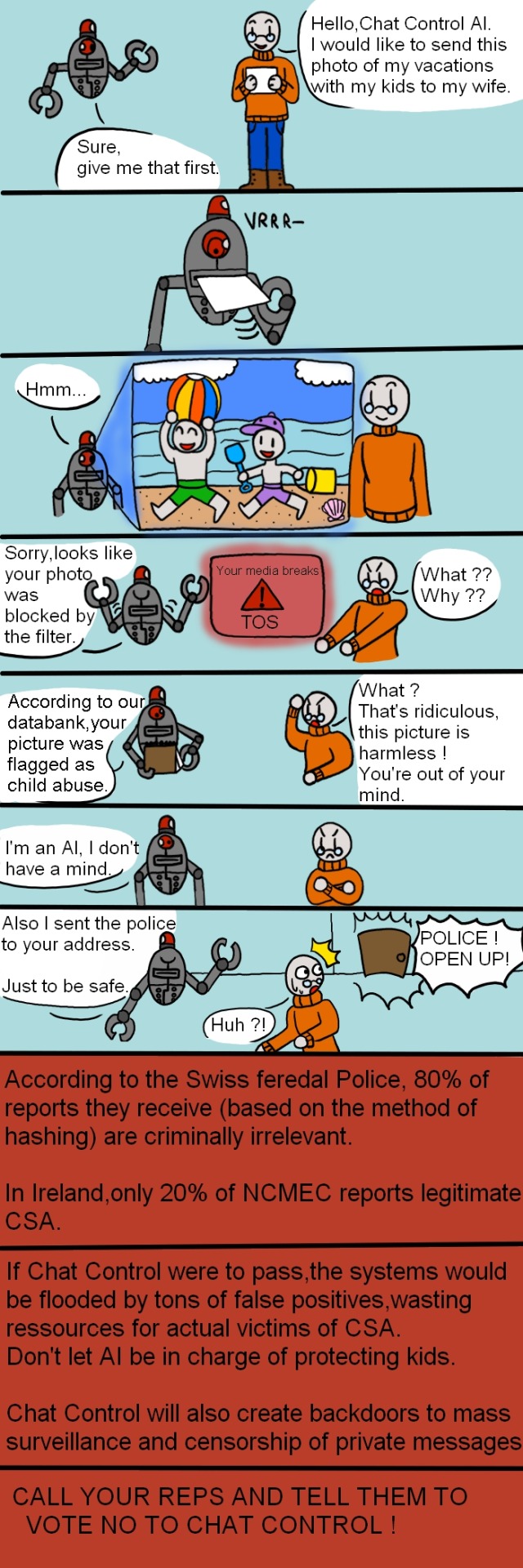
287 notes
·
View notes
Text
To give you some hope in this seemingly uncertain year, we just had a historical enby win in Europe!
The European Court of Justice has officially ruled that it is unlawful for a railway company to collect a customer's gender marker. This is because this personal data is unnecessary when purchasing a train ticket and could lead to discrimination on the basis of someone's gender identity.
The impact of this case goes far beyond train travel. From now on, all public and private companies that are bound by the GDPR legislation must follow this ruling and stop collecting this data if it is not strictly necessary. This will have a positive impact on the lives of non-binary people who are often forced to choose between two options (e.g. Mr. or Mrs.) that do not match their identity.
The ruling concerns a case in France in which 64 non-binary people challenged the National Company of the French Railways (SNCF)'s practice of forcing train passengers to choose between 'Mr' or 'Mrs' on their train tickets, with the train company not offering a third option. TGEU and ILGA-Europe supported Association Mousse and its lawyers in the case.
51 notes
·
View notes
Text
OI! FACEBOOK USERS WHO HATE AI! GUESS WHAT!
META IS GOING TO FEED YOUR POSTS AND IMAGES AND COMMENTS TO THEIR AI!
From what I understand this is already being implemented for Americans, with no opt-out option, but there is apparently a form you can fill in to ask them to remove all your data.
For us in the EU, we can fill in a form to object to our stuff being added, but there are some things we need to pay extra attention to:
Meta has to approve of the objection — meaning that sending it in doesn't necessarily mean it will go through
In the country they want the ISO country code (e.g. SE for Sweden). I read that someone got it to work by writing Italy rather than Italia, but I am unsure if that works for all countries
EVEN IF YOUR OBJECTION IS APPROVED, YOUR STUFF CAN BE ADDED TO META AI IF SOMEONE WHO HASN'T OBJECTED TO META AI SHARE YOUR POST/IMAGES TO THEIR PAGE
A verification code will be sent to your email, so make sure you write in the email you use for fb correctly and be prepared to check the spamfolder
It's supposed to be implemented the 26th of June here, so do it asap
MAKE SURE TO MENTION GDPR!!!
I don't know what the situation about this is for people outside EU, so if you happens to know please add to this with whatever information you have!
Check the notifications on your fb account and you should find one from Meta with all the relevant links there!
I will also copy what I wrote in the form into the comments on this post (for easy copying) in case someone doesn't have the spoons to write their own reasons. It's far from perfect but it's better than not doing it at all.
Also I don't know if this includes Instagram, I couldn't see anything about it over there, but I imagine it does or will soon enough, so keep your eyes open for that too.
(Also, hate to be that person, but please reblog to spread awareness!)
#facebook#meta#ai#meta ai#fuck ai#generative ai#instagram#facebook meta#psa#facebook psa#ai psa#meta psa#psa meta#psa facebook#psa ai
117 notes
·
View notes
Text
Big Tech may have found their response to the European Union’s (EU) digital competition and content moderation policies: tariffs. “We’re going to work with President Trump to push back on governments around the world,” Meta CEO Mark Zuckerberg said in his announcement eliminating the company’s fact-checkers. President Trump, of course, has described himself as a “Tariff Man.”
Europe’s “ever-increasing number of laws, institutionalizing censorship” were number one on the Zuckerberg target list. The only way Meta “can push back on this global trend is with the support of the U.S. government,” he explained, adding, “that’s why it’s been so difficult over the past four years when even the U.S. government has pushed for censorship.”
The semantic conflation of curatorial responsibility and censorship, a familiar domestic political gambit, has been internationalized and weaponized to attack the expectation—at least in Europe—that media platforms like Meta should practice responsible content curation.
Tariffs and truth
Thanks to intensive lobbying by Big Tech, the U.S. Congress has done little to provide meaningful oversight of the digital platform companies. The tech CEOs invited to the Trump inaugural lead companies that dominate the free flow of information, invade personal privacy, and pervert the competitive marketplace. Yet, these companies have been able to avoid meaningful domestic oversight for their entire existence.
The void created by American inaction has been filled by EU regulations despite the companies’ strong objections. Combining claims of censorship with Donald Trump’s affinity for tariffs just might be the leverage Big Tech seeks against the EU’s digital policies. Mark Zuckerberg appears ready to spearhead the effort.
By framing the EU’s actions as “institutionalizing censorship,” and asserting that the EU is “going after American companies and pushing to censor more,” Zuckerberg presses all the right MAGA buttons to provide a rationale for the Trump administration to fight the EU’s decisions. It is not a surprising strategy, and is made even more significant because it reverses previous corporate policy.
After the January 6 insurrection, Facebook along with Twitter suspended Donald Trump’s account. “They shouldn’t be allowed to get away with this censoring and silencing,” President Trump said at the time. Accusing Zuckerberg of plotting against him, Trump wrote in a 2024 book that the Meta CEO could, “spend the rest of his life in prison.”
Meta’s 2025 policy switch, however, has been met with the new president’s approval. Asked if Meta was responding to his earlier threats, Trump replied, “probably,” adding, “I think they have come a long way.”
What’s the fuss over EU regulation?
The EU has enacted multiple laws to try and provide oversight of the previously unsupervised activities of Big Tech. It started in 2018 with privacy protection under the General Data Protection Regulation (GDPR). In 2022, the European Parliament passed the Digital Markets Act (DMA) to deal with the lack of digital marketplace competition. Twenty-twenty-four saw the AI Act (AI) establishing a regulatory framework for artificial intelligence.
All these actions were aggressively fought by Big Tech. But for social media companies, the EU legislation that is the biggest challenge is the 2022 Digital Services Act (DSA). This law covers a handful of online platform companies deemed pervasive enough to be “gatekeepers” with a new style of regulation.
Instead of the traditional form of regulatory oversight that micromanages how a company operates, the DSA establishes expectations for what the company will deliver. These expectations include content moderation and transparency. The law does not specify how moderation is achieved, but that it is being done in a meaningful and significant manner. Far from regulatory micromanagement of corporate operations, the companies are required to self-certify that they are delivering on the law’s expectations. If they are not, then there are penalties.
While Meta has eliminated fact-checking in the U.S., it has not done so in the EU. It is hard to certify content moderation, as the DSA requires, when you’ve fired all the moderators. This has created a conflict between the company’s U.S. practices and EU requirements. Even if it represents a legal problem, the decision is good for the company since social media platforms, such as Meta, thrive on engagement-stimulating, unedited rage, and bottom-line profits should increase with the elimination of fact-checking jobs.
Elon Musk and NATO—a signal?
Comments by Vice President Vance during the 2024 campaign hinted at leveraging the power of the federal government to deal with DSA requirements. Asked in an interview whether American support of NATO could hinge on whether the EU regulated Elon Musk’s social media platform X, Vance responded affirmatively.
“So, what America should be saying is, if NATO wants us to continue supporting them and NATO wants us to continue to be a good participant in this military alliance, why don’t you respect American values and respect free speech?” Vance said. “It’s insane that we would support a military alliance if that military alliance isn’t going to be pro-free speech. I think we can do both. But we’ve got to say American power comes with certain strings attached. One of those is respect free speech, especially in our European allies.”
These comments reveal a willingness to link trade and security to digital regulation. A tariff-based response to EU policies seems plausible under such a mindset.
A regulation vs. trade crusade?
On his first day as President of the United States, Donald Trump said “tariff is the most beautiful word in the dictionary.” A few days later, he threatened the EU with tariffs unless they bought more U.S. oil and gas.
The U.S. has a trade deficit with the EU when it comes to goods such as oil and gas but a favorable trade balance when it comes to services such as those of Big Tech. The challenge, therefore, is not to use tariffs to force the EU to buy more, but, as Zuckerberg told the Joe Rogan podcast, “the United States should be defending its companies.”
Caught between a U.S. Congress that has done little to protect against misinformation and hate, and the world’s second largest trading block which has tried to combine freedom of expression and the expectation of curatorial responsibility, Big Tech faces a dilemma. The combined arguments of censorship and defending American companies is a powerful elixir served to an audience of one man.
Wall Street analysts hail Mark Zuckerberg as “the best CEO of our time” for his ability to align Meta’s self-interest with prevailing political winds. The emerging narrative of “censorship vs. trade” is a powerful, if calculated, political move. Threatening tariffs in response to EU digital regulations could be a strategy that appeals to “Tariff Man.”
Ironically, this push comes at a time when artificial intelligence offers low-cost tools for fact-checking and content moderation. Yet, the political calculus behind the “censorship vs. trade” strategy may overshadow technical realities.
Mark Zuckerberg’s maneuvering is a shrewd effort to redefine the debate about European digital regulation. The question now becomes whether President Trump will add relaxed enforcement of the EU’s digital laws—all of them—to his list of trade demands.
15 notes
·
View notes
Note
Just wanted to let you know, the api that was used is hosted in Russia (and therefore isn't liable under GDPR). There have been many concerns associated with it regarding data privacy like, selling individuals' personal information, refusing to delete when a request is submitted, and so on. The legality of its activities might depend upon a country's laws but I think upon reading its terms and policy, most people would agree that it is unethical.
Gdpr is only liable inside the European Union regarding EU citizens. You're not saying what you think you are. Also, we're not selling information. But sure, you want a path that doesn't go through pullpush? Here you go!
#unethical to who??#they posted the thing themselves#we're just having a conversation about it#911#i really need a tag for asks#anon 😌#spy network
25 notes
·
View notes
Text
"What does the CJEU decision [that data should refer to a person's lived gender identity, not that assigned at birth] mean for the UK?
The UK's position on gender recognition is now nominally at odds with the EU's Data Protection regime. But the UK mustn't let their data protection regime come unmoored from the EU's, or they will lose their status of 'adequacy', threatening the free exchange of personal data that their economy relies upon.
So it seems likely that this is the high water mark for the Imperial gender binary. The UK Supreme Court decision applies to one word in one act. But, without coming undone from the principles of data protection, the UK state can't lawfully take actions to process people's gender data in a way that ignores their lived experience in favour of their gender status at birth. If the government tries to operationalise the judgment more generally, the UK GDPR sits waiting for it like the troll under the bridge."
- Simon McGarr, The Gist: Trans rights are Data rights
#uk#uk politics#trans#transgender#uk supreme court#trans uk#trans news#news#fantastic article#data protection#gdpr#eu#europe#uk news
11 notes
·
View notes
Note
im not gonna lie, a little sad n disappointed that u use genAI for images…
Not gonna lie, I am very sad and disappointed that this is a conversation that is need to be had, on the platform of a TMNT reader insert writer. A conversation base of an image, created for the soul purpose of creating a idea for an outfit in a smut, generated in a part of the world, where AI regulations are becoming more and more strict (which I fully support, may I add), with the focus on ethical usage of Data and AI, among many other laws that are put in place to protect people's jobs and their personal data.
I live in the EU - one of the places with the most strict laws when it comes to personal data, and one of the first places to actually put an AI law into place. The AI act of 2024.
To those of you that do not know about the EU AI act, you can read about it here on the EU Parliament's webside: https://www.europarl.europa.eu/topics/en/article/20230601STO93804/eu-ai-act-first-regulation-on-artificial-intelligence


In other words, the EU wants AI to help create jobs and job opportunities, not steal them. Part of that is classifiactions. The AI I used to help give the reader an idea of what Bluestar's outfit would be (which I also disclosed as an AI image, as the law requrise in this part of the world), is classified as a low/lower-risk generative AI, that has to follow transparency requirements and the EU copyright law.
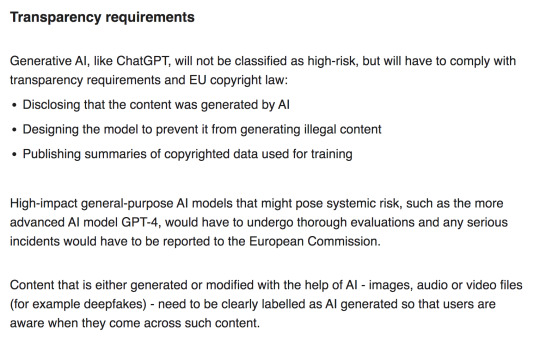
I do not know how other countries tackles AI, nor what laws they are planning on putting in place. I follow along in the EU and Danish conversations and laws about AI, as they actually are a big part of my studies as a future pedagog.
Part of my job is to look at AI as an aiding tool - not an overtaker. More specifically, I am learning how I can use AI as a tool for people in our community, at may have limited ways of expression or need extra help. Along with that, I also have make sure that the AI used, aline with the EU GDPR law (General Data Protection Regulation), as that is very much a big part of not just my future job, but everyone else's in the EU.
Now, I've just told you about the EU AI Act of 2024, but not how my country of Denmark has been talking and putting in protective measures on AI since 2019, with the focus on ethical usage of AI, aka protecting people and their jobs. Heck, this is the country that outlawed Uber, because it took jobs from Taxi drivers.
Companies in Denmark has been requred - by law - to report on their use of AI and Data Ethics since 2021. In other words, my country take AI and data very seriously, and don't mess around when it come to that.
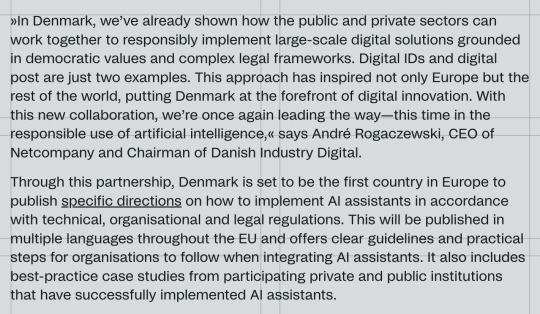
Why this focus on the EU and Denmark you may ask? Well, that's because all of these laws and proposed laws, are some that I follow on a daily basis as a Danish citizen. A country that has focused on the digital ethics for years. I live in a country, where we teach children how to use AI in an ethical manner, and where we teach university how to use AI as a tool - a compliment to their studies - and not something that is supposed to take over their studies, rendering them obsolete.
I'm sorry, but whatever lack of rules and regualtions other countries may have, does not apply to me, and the increasingly strict set of rules I have to follow in my country.
I am very aware that people in Hollywood are losing their jobs due to AI, and I think it's horrifing. I'm very aware that graffic designers in other countries have lost jobs to AI, and it makes me very sad. But I am not a lord of regulations in other countries - missing or not. I am just a Danish citizen, following the Danish law and rules, and whether or not other places will look at such rules and laws themselves, I have no control over.
I am sad and disappointed in the comments in my Inbox, that is calling me all sorts of names, saying that I don't care about the environment, because I generated an AI image, totally disregarding the fact that I live in one of the most carbon neutral cities in the western world, and not knowing that I was one of the first generations of students, studying at the Danish FN's World Goals profile schools.
I am sad and disappointed in the comments in my Inbox, telling me i am uneducated, when this is literally part of my studies. When my studies and future job opportunities - among many others -, literally requries that I'm up to date with the laws regarding data and AI usage for my own country, and have been doing so, ever since I first started working in 2020.
I am sad and disappointed in the comments in my Inbox saying that I am ruining the job opportunities, because I didn't pay an artist to illustrate an image. What money may I ask you? I'm a student, doing this for free, because I enjoy it, with literally no monetary gains from this, what so ever. So what money??
I am sad and disappointed that the platform I use to write TMNT stories, should now become a ground for dicussions about AI, when that is something that should be taken up with the rule makers of where ever you live, and not a TMNT reader insert writer on Tumblr.
I refuse to take further part in the discussion about AI using my Tumblr platform, only deciding to do so now, as many messages I started recivieng were hurtful, starting to boarder on the abusive.
I leave you with this power point, showing you how AI is viewed along side jobs and people's job views and opportunities in Denmark as by 2024, made by the Nordic firm Implement Consultation Group.
Remember to treat each other with kindness, and understand the round world is different everywhere💚
8 notes
·
View notes
Text

[ID: a checked box with text from archiveofourown.org that reads: "By checking this box, you consent to the processing of your personal data in the United States and other jurisdictions in connection with our provision of AO3 and its related services to you. You acknowledge that the data privacy laws of such jurisdictions may differ from those provided in your jurisdiction. For more information about how your personal data will be processed, please refer to our Privacy Policy."]
I find the language in this strange, i suppose this is meant to be able to run the site while not complying with the EU's GDPR datalaws? Also theres not federal data privacy laws in the US, only statewide laws that differ from each other. So what state is it in?
According to the privacy policy its because they use "subprocessors" like google, 1password and amazon web services that process some of the data.
I like ao3 well enough but this is...odd, ive never seen a website ask you to check this kind of thing
8 notes
·
View notes
Text
What to consider with TikTok and Red Note
I'm feeling spicy today, I know.
So, unless you've been hiding under a rock the past year, you're probably aware that the US government is looking to ban TikTok. Politicians will split hairs insisting it is not a ban so I'm not going to argue whether or not it is. What I will argue is this:
Privacy rights within the United States are in stark contrast to the EU's GDPR (aka, the right to be forgotten). Here, if you post something online it will likely stay there forever. You can attempt to use the leverage of the GDPR to get info removed, but if you are not in the EU or a EU citizen, it is possible that tech companies will just choose not to comply. I work in this field. I have personally handled GDPR requests. I have seen it on the inside.
In the US, there ARE some level of privacy concerns with HIPAA and other identifiable data points. Aside from HIPAA, it's often just best efforts to retain your data privacy.
Which leads to the big issue. In the wake of the Patriot Act in the US, the US government has worked closely with social media companies to access and analyze social media data. Even if you ignore the personal implications of data privacy (I started studying on Duo Lingo and now all my adds are no longer in English. Spooky, huh? Want a really unsettling one? I'm learning Hebrew and I started getting anti-Israel ads. Put your opinions on Gaza aside for a second and consider how sinister that is)
Anywho. What I want to emphasize is that the US government doesn't give a crap about your privacy. We'd have the GDPR if they did. The US government doesn't want OTHER countries--especially China--to have access to data and data trends.
So, by all means join the movement to Red Note, but do consider the privacy concerns and how much you want China to know about you.
Frankly, you should consider what data you want the US government to know.
#data privacy#online privacy#internet privacy#gdpr#gdprcompliance#tiktok#patriot act#rednote#besafe#bemad#protest#useyourvoice#meta#facebook#instagram#twitter#x
6 notes
·
View notes